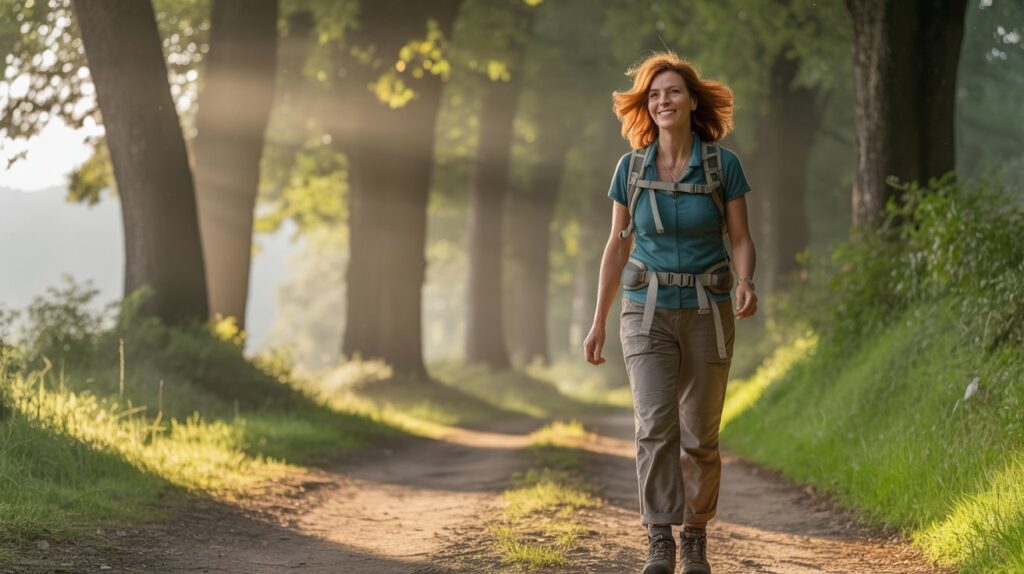What You’ll Discover in This Article:
You’re successful. You’re accomplished. You run companies, manage teams, juggle impossible deadlines, and somehow still make it to your daughter’s piano recital. So why does everything feel like you’re perpetually running to catch a train that left the station three hours ago? This article explores why the most powerful people in the world swear by morning routines—and why you might actually need one too. Not because you’re failing, but because you’re ready to stop merely surviving and start genuinely thriving.
Five Key Takeaways for Time-Starved Professionals
- Morning routines aren’t about productivity theatre—they’re about reclaiming sovereignty over your own nervous system before the world makes its demands.
- The first hour of your day sets your biochemical tone—cortisol, decision fatigue, and emotional resilience are all established in those precious morning moments.
- High achievers who resist routines often do so because they’re already running on empty—creating structure feels like “one more thing” when you’re already sinking in quicksand.
- A morning routine isn’t another item on your to-do list—it’s the foundation that makes everything else possible, including being present for the people you love.
- Starting small changes everything—you don’t need a three-hour ritual involving yoga, journaling, and cold plunges. You need ten intentional minutes that belong entirely to you.
Introduction: You’re Awake at 4:11, Again
It’s 3:47 in the morning, and you’re awake again.
Not because you want to be. Not because you’ve suddenly been blessed with the gift of insomnia as a life hack. But because your mind is already racing through tomorrow’s presentation, the difficult conversation you need to have with your business partner, whether you remembered to sign the permission slip for your son’s field trip, and that nagging sensation that you’re somehow letting everyone down—including yourself.
You’ve read the articles. You know the statistics. Establishing well-defined habits conserves mental energy whilst staying focused on priorities, and in 2025, leading executives have refined their morning habits to enhance mental clarity, physical well-being, and productivity. But here’s the thing nobody tells you: when you’re already overwhelmed, the idea of adding anything else to your day—even something beneficial—feels like being asked to juggle flaming torches whilst standing on one leg.
So let me ask you directly: Why do you need a morning routine?
The answer isn’t what you think. It’s not about becoming more productive (though that’s a useful side effect). It’s not about optimising every moment of your existence until you’re essentially a well-dressed robot. It’s about something far more profound: reclaiming your life before your life reclaims you.
I’ve spent twenty years working with professionals exactly like you, people whose external success masks an internal chaos that’s becoming increasingly difficult to manage. For the past fifteen years, I’ve hosted stress management retreats where guests walk the ancient Camino de Santiago, finding their rhythm again through mindfulness, meditation, and the simple act of putting one foot in front of the other. I’ve written eight non-fiction books about divorce, loss, unexpected illness, and coping with crises—the unglamorous territory of being human when life doesn’t go according to plan. And I’ve gathered over forty testimonials from guests who’ve discovered that transformation doesn’t require dramatic gestures; it requires consistent, intentional attention to the moments that matter most.
Including the morning ones.
Alan Nottman’s 4:13 AM Epiphany
Alan Nottman stood in his kitchen at 4:13 AM, staring at the coffee machine as though it held the secrets to the universe. Outside, the world was still mercifully dark, that particular quality of pre-dawn darkness that feels both peaceful and vaguely accusatory, depending on why you’re awake.
He wasn’t supposed to be awake.
The coffee machine gurgled to life—a sound he knew so intimately he could probably identify it in a police line-up of household appliances. His hand reached for the mug before his brain fully engaged, muscle memory from years of predawn wake-ups. The ceramic was cold against his palm, a small shock of reality that made him pause.
How many mornings had he stood in this exact spot, this exact position? How many times had he promised himself “just this week” or “after this project” or “once things settle down”? And how many times had “things settling down” proven to be as mythical as unicorns or balanced budgets?
Alan’s feet were cold on the kitchen tiles—he’d forgotten slippers again. The chill travelled up through his heels, a creeping reminder that his body still existed beneath the suit and the titles and the carefully cultivated persona of someone who had everything under control. His shoulders ached. When had they started aching? Probably around the same time his jaw had started clenching during conference calls, though he couldn’t pinpoint exactly when that had begun either.
The coffee finished brewing, releasing that rich, almost chocolatey aroma that had once meant possibility but now simply meant survival. He poured it slowly, watching the dark liquid fill the mug with the kind of intense focus usually reserved for bomb disposal or signing divorce papers. Which, he thought darkly, weren’t entirely unrelated activities in his current life trajectory.
His phone buzzed on the counter—a dull, insistent vibration that made his stomach tighten before he even looked at the screen. Emails. Of course. Because somewhere in the world, it was already business hours, which meant somewhere in his world, someone needed something. The notification count glowed like a small, accusatory sun: 47 unread messages since he’d checked at midnight.
Midnight. When he’d finally climbed into bed next to his wife, Sarah, trying not to wake her, though they both knew she was already awake, pretending to sleep because it was easier than acknowledging the growing chasm of unspoken resentments between them. When had they stopped talking? Really talking, not just exchanging logistics about school pickups and whose turn it was to call the plumber?
Alan lifted the coffee mug to his lips, and the steam rose into his face—warm, almost intimate, like a secret being shared. The first sip burned slightly, that perfect edge of discomfort that meant the coffee was exactly the right temperature. He closed his eyes, just for a moment, allowing himself this small pleasure.
And in that moment, with his eyes closed and the coffee warming his hands and the silence of the pre-dawn kitchen wrapping around him like a cocoon, something shifted.
It wasn’t dramatic. There were no angels singing or celestial lights breaking through his ceiling. But Alan became suddenly, achingly aware that this might be the only moment today that truly belonged to him. Not to his clients. Not to his board of directors. Not to the seventeen people who reported to him or the quarterly earnings call that would determine whether his company met projections. Not even to his children, whom he loved desperately but saw mostly as tired faces across the dinner table, faces that had started looking at him with a mixture of need and resignation, as though they’d already accepted his absence even when he was physically present.
This moment. This coffee. This kitchen. This strange, liminal space between night and day. It was his.
And he was wasting it checking emails.
Alan set down his phone with deliberate care, as though it might explode if handled roughly. His hand trembled slightly—adrenaline or exhaustion, he couldn’t tell anymore. They felt increasingly similar. He looked around his kitchen properly for the first time in months: the stack of school artwork pinned haphazardly to the fridge, his daughter’s drawing of their family where he appeared as a tiny figure in the corner, holding what looked like either a briefcase or a tombstone. The pile of unread cookbooks his wife had bought during that brief period when she’d convinced herself that if she just made more elaborate meals, he’d come home earlier. The motivational magnet someone had given him that read “Success is a journey, not a destination,” which had always struck him as something people said to justify never actually arriving anywhere.
The kitchen smelled like coffee, yes, but also like the faint ghost of last night’s dinner—something with garlic that his daughter had refused to eat, leading to the usual negotiation, followed by the usual defeat, followed by cereal before bed. The smell of family life, messy and imperfect and somehow both comforting and suffocating.
Alan’s breathing had slowed. He noticed this with surprise, the way you notice you’ve been humming a song without realising it. His shoulders had dropped maybe half an inch, though they still carried enough tension to qualify as mountain ranges. The clock on the microwave blinked 4:19 AM. Six minutes had passed. Six minutes of not checking emails, not planning, not optimising, not achieving. Just… being.
He heard a sound from upstairs—the pipes groaning as water moved through them, which meant Sarah was awake too, probably standing in their ensuite bathroom, staring at herself in the mirror and wondering when her husband had become a stranger who occasionally slept in her bed. The thought made his chest tighten with a guilt so familiar it had almost become comfortable.
What if, Alan thought, the question wasn’t “How do I fit more into my day?” What if the question was “How do I make sure the day doesn’t steal everything from me before I’ve even had a chance to remember who I am?”
He took another sip of coffee. The taste had changed slightly now that it had cooled—less bitter, more complex, with subtle notes he’d never noticed before because he was usually already halfway out the door by this point in his morning.
Alan looked at his phone again, still buzzing periodically like an insect trapped in amber. For the first time in years, he made a choice that terrified him more than any board meeting or earnings call ever had: he decided not to pick it up. Not yet. Not for another ten minutes. Maybe twenty.
He had no idea what he’d do with those minutes. He had no routine, no plan, no productivity hack to optimise this thin slice of morning. But standing there in his kitchen with cold feet and warm coffee and the strange sensation that he’d just stumbled across something important without even looking for it, Alan Nottman decided that maybe, just maybe, not having a plan was exactly the point.
That’s when the real work began.
The Annoying Truth About Morning Routines
Here’s what nobody tells you about morning routines: they’re not really about the morning at all. They’re about identity.
Every morning, whether you realise it or not, you’re making a fundamental choice about who you are and what your life means. Are you someone who reacts, or someone who responds? Are you a person whose day owns them, or someone who owns their day? These aren’t abstract philosophical questions—they’re neuroscience.
Research has found that well-defined routines can reduce cognitive load, freeing mental resources for creative thinking. But let’s translate that from academic-speak into human terms: every decision you make depletes your energy. Every time you wonder, “What should I do next?” you’re spending precious mental currency that you’ll need later for actual important decisions. By the time you’ve decided what to wear, what to eat, whether to exercise, and how to respond to the seventeen things demanding your attention before 8 AM, you’re already exhausted. And you haven’t even started work yet.
A morning routine isn’t about optimising your productivity (though that happens). It’s about protecting your nervous system from the onslaught of demands, decisions, and digital noise that will otherwise colonise your consciousness before you’ve had a chance to remember what you actually care about.
Think about it this way: when you board an aeroplane, the flight attendants tell you to put on your own oxygen mask before helping others. This isn’t selfishness—it’s survival. Your morning routine is your oxygen mask. It’s the twenty minutes (or two hours, or even just ten minutes) where you remember that you’re not merely a productivity unit or a problem-solving machine. You’re a human being with a body that needs care, a mind that requires stillness, and a spirit that deserves to be more than merely functional.
The Ripple Effect: How Your Morning Changes Everything
But here’s where it gets really interesting: your morning routine doesn’t just affect you. It affects everyone around you.
I’ve watched this transformation countless times during my Camino de Santiago retreats. Someone arrives frazzled, disconnected, running on fumes and force of will. They start each day with simple mindfulness practices before walking—nothing elaborate, just breathing, noticing, being present. Within days, their entire demeanour shifts. They become more patient. More present. More genuinely themselves. And then they start talking about the changes they want to make when they return home. Not huge, sweeping changes. Small ones. Like reclaiming their mornings.
Those small changes ripple outward. A parent who’s less frazzled in the morning creates a calmer household for their children. An executive who’s centred before entering the office makes better decisions and creates less stress for their team. A partner who’s taken time to care for themselves has more capacity to genuinely connect with their spouse. This isn’t new-age philosophy—it’s practical emotional ecology.
We live in an interconnected system. Your stress is contagious. But so is your calm. So is your groundedness. So is your capacity to be fully present for the people and moments that matter.
The Community Dimension: Beyond Individual Transformation
In my storytelling circles, we explore this idea regularly. We gather—professionals, parents, people navigating transitions—and we tell stories about the moments that changed us. And repeatedly, the stories that resonate most deeply are about small morning moments: the cup of tea drunk in silence before the house wakes, the ten-minute walk around the block, the journal entry that unlocked clarity, the meditation that reconnected someone to their own breath.
These aren’t trivial domestic details. They’re the foundation of resilient communities. Because communities aren’t built by exhausted, overwhelmed people running on empty. They’re built by individuals who’ve learned to care for themselves well enough that they have genuine capacity to care for others.
When you establish a morning routine, you’re not just changing your day—you’re participating in a quiet revolution of people choosing presence over productivity theatre, depth over distraction, being over merely doing.
Three Powerful Writing Prompts to Explore Your Morning Identity
Grab your journal (or open your notes app, I’m not precious about the format) and spend ten minutes with each of these prompts:
1. The Morning Inventory Describe your typical morning in excruciating sensory detail. What do you hear, smell, feel, taste, see? Don’t analyse or judge—just observe and record. Then ask yourself: Is this the morning of someone living the life they want, or someone surviving the life they have?
2. The Future Morning Write about your ideal morning five years from now. Not the Instagram-perfect, perfectly lit version—the real one. What does it feel, sound, smell like? Who else is there? What emotional quality does it have? How does your body feel? What’s the first thought you have when you wake? Now ask yourself: What’s the smallest step I could take tomorrow to move one inch closer to that morning?
3. The Morning Legacy Imagine your children, or your team members, or your closest friends describing your morning energy to someone else. What would they say? Would they describe someone rushed, stressed, distracted? Or someone grounded, present, intentional? Write the description you’d want them to give, then write the description they’d honestly give today. The gap between those two descriptions is your invitation to change.
Further Reading: Five Unconventional Books That Will Transform Your Relationship with Mornings
Most books about morning routines are insufferably prescriptive: wake at 5 AM, meditate for an hour, run ten kilometres, drink green juice, optimise your mitochondria. These books are not that. These are books that understand the deeper questions beneath the surface ones.
1. “The Miracle of Mindfulness” by Thich Nhat Hanh
Why this book: This Vietnamese Buddhist monk doesn’t tell you what to do with your mornings—he teaches you how to be fully present for whatever you’re doing. Whether you’re washing dishes or drinking tea, he offers practices for transforming ordinary moments into extraordinary ones. For the busy professional who believes they don’t have time for elaborate routines, this book reveals that presence isn’t about time—it’s about attention. And attention is something you can practise anywhere, including in your kitchen at 6 AM whilst making coffee.
2. “My Grandmother’s Hands: Racialised Trauma and the Pathway to Mending Our Hearts and Bodies” by Resmaa Menakem
Why this book: This might seem like an unusual choice for a morning routine book, but stay with me. Menakem explores how trauma lives in our bodies and how we can heal through somatic practices. Many high-achieving professionals carry stress not in their minds but in their clenched jaws, tight shoulders, and shallow breathing. Your morning routine needs to address your body, not just your schedule. This book offers practical body-based practices that take minutes but can shift your entire nervous system. It’s especially valuable for understanding how your morning stress patterns might be inherited survival responses rather than personal failings.
3. “Kitchen Table Wisdom” by Rachel Naomi Remen
Why this book: Remen, a physician who counsels people with life-threatening illnesses, writes about the wisdom found in ordinary moments. Her short, story-driven essays are perfect for reading in small increments—perhaps, say, during a morning routine. What makes this book invaluable is her understanding that transformation doesn’t happen through grand gestures but through small, consistent moments of noticing, caring, and choosing differently. Her writing reminds us that our morning routine isn’t about perfection—it’s about practising kindness towards ourselves.
4. “Braiding Sweetgrass” by Robin Wall Kimmerer
Why this book: Kimmerer, a botanist and member of the Citizen Potawatomi Nation, writes about the indigenous practice of greeting the day with gratitude and attention to the natural world. Her lyrical writing invites us to consider our morning not as a productivity sprint but as a threshold moment where we cross from the dream world into the waking world. For professionals who feel disconnected from their bodies and the natural world, this book offers a gentle reconnection. Reading even a few pages in the morning can shift your entire orientation from scarcity and urgency to abundance and relationship.
5. “The Practice of Groundedness” by Brad Stulberg
Why this book: Stulberg writes for high-achievers who’ve discovered that constant striving has left them feeling unmoored and exhausted. Unlike traditional productivity books, this one argues for groundedness over growth, presence over performance. He offers practical frameworks for building routines that create stability rather than just efficiency. What I particularly value is his honesty about the challenges of maintaining practices when life gets chaotic—because life always gets chaotic. This book acknowledges that reality whilst still offering genuine pathways forward.
PS: And Then There’s “Embracing Change – in 10 Minutes a Day”
I wrote this book for people exactly like you: professionals who believe they don’t have time for transformation. The premise is simple and perhaps slightly rebellious: meaningful change doesn’t require hours of daily practice. It requires ten minutes of consistent, intentional attention. The book offers daily practices for navigating transitions, building resilience, and reclaiming your life from the tyranny of urgency. Many of the practices work beautifully as morning routines precisely because they’re designed for time-starved, overwhelmed humans who are doing their best with limited resources. It’s available on my website, and I wrote it because I was tired of transformation being marketed as something that requires wealth, leisure, and a personal assistant to manage your existing commitments whilst you become enlightened.
Real Voices: Two Stories of Morning Transformation
Sarah’s Story: From Camino Guest to Morning Advocate
“I arrived at Dr Montagu’s Camino retreat in pieces. Successful on paper, shattered in reality. The idea of a ‘morning routine’ felt like a joke—I could barely manage to get dressed most days without feeling overwhelmed. But those mornings on the Camino changed everything. We’d wake early, gather for simple mindfulness exercises, then walk in silence as the sun rose. Nothing elaborate. Just breathing, walking, noticing. For the first time in years, I experienced mornings that didn’t feel like an assault. When I returned home, I was terrified of losing that peace. But I didn’t. I started with just ten minutes before my family woke—sitting in silence, drinking my coffee with actual attention. That ten minutes has become the anchor of my entire day. I’m not exaggerating when I say it saved my marriage and my sanity. Those mornings on the Camino didn’t just give me a routine—they gave me back my life.” — Sarah T., Marketing Director, London
Jennifer’s Story: Empty Nest, Full Mornings
“Joining Dr Montagu’s storytelling circle seemed frivolous at first. My children had left home, my career was winding down, and I felt invisible and purposeless. But in those circles, I discovered something profound: my stories mattered. And the story that surprised me most was about my mornings. For thirty years, my mornings had belonged to everyone else—getting children ready, managing household chaos, coordinating schedules. When that ended, I felt lost. I had no idea who I was in the morning without someone needing me. The storytelling circle helped me see that reclaiming my morning wasn’t selfish—it was necessary. I started small: tea on my patio, watching birds, writing in my journal. Those quiet mornings taught me who I am beyond mother, beyond wife, beyond professional. I’m someone who loves the way morning light looks on leaves. Who thinks better with a warm cup in her hands. Who still has stories to tell, even if they’re just to myself. My mornings now aren’t about productivity—they’re about companionship with myself. That might sound strange, but it’s the most important relationship I’ve rebuilt.” — Jennifer M., Teacher (retired), Manchester
Five Razor-Sharp FAQs
Q1: I barely have time to shower in the morning. How am I supposed to add a routine?
Here’s the uncomfortable truth: you do have time. You’re choosing to spend it reactively—checking emails in bed, scrolling news whilst brushing your teeth, letting the morning happen to you instead of with you. Start with five minutes. Set your alarm five minutes earlier. Use those minutes to sit quietly and breathe. Not meditate perfectly, not optimise, not achieve—just breathe. If you genuinely cannot find five minutes, your morning routine is the least of your problems. You need to examine your entire life structure, because you’re living in crisis mode masquerading as normal life.
Q2: What if I’m not a morning person?
Then adapt the principle to whenever you wake. The point isn’t to become someone who leaps from bed at 5 AM singing showtunes. The point is to create a deliberate threshold between sleep and the demands of your day. If you naturally wake at 9 AM, your morning routine happens at 9 AM. The time matters far less than the intention. That said, you might discover you’re not actually “not a morning person”—you’re a person who’s been treating mornings as an enemy to overcome rather than an ally to befriend.
Q3: What if my routine stops working?
Then it stops. Routines aren’t meant to be rigid structures that you maintain through force of will when they’re no longer serving you. They’re meant to evolve with your life. Pregnancy, illness, job changes, family crises—these all require adaptation. The flexibility to adjust your routine when circumstances change isn’t failure. It’s wisdom. Start again. Start smaller. Start differently. The point is the starting, not the perfection.
Q4: Can’t I just have coffee and get on with my day? Why does everything have to be so intentional?
You absolutely can. And if your life is genuinely working brilliantly, if you’re deeply satisfied, connected, energised, and fulfilled, then carry on. But you’re reading this article, which suggests something isn’t working. The question isn’t “Why does everything have to be so intentional?” The question is: “What happens when you spend your entire life on autopilot, never stopping to ask if you’re actually heading where you want to go?” Intention isn’t the enemy of spontaneity—it’s the foundation that makes genuine spontaneity possible.
Q5: What if I try and fail? I’ve tried morning routines before and they never stick.
Then you’ve learned what doesn’t work for you. Try differently, not harder. Maybe you’ve been attempting someone else’s ideal morning instead of designing your own. Maybe you’ve been making it too complicated. Maybe you’ve been treating your morning routine as another achievement to optimise rather than a gift you give yourself. Here’s a radical thought: what if “failing” at a morning routine just means you haven’t found your rhythm yet? Keep experimenting. Treat it like play rather than performance. And remember: even one morning of choosing presence over reactivity is worth celebrating, not dismissing because you “failed” the rest of the week.
Conclusion
So why do you need a morning routine?
Not because you’re broken and need fixing. Not because you’re insufficiently optimised or productive. Not because successful people do it and you should too.
You need a morning routine because you deserve to remember who you are before the world tells you who you need to be today.
You need a morning routine because your nervous system deserves a moment of peace before the onslaught begins.
You need a morning routine because the people you love deserve the best version of you, not the frazzled, depleted version that’s left over after you’ve given everything away to everyone else.
You need a morning routine because life is short, and spending your mornings in reactive chaos isn’t how you want to spend the precious, limited mornings you have remaining.
And mostly, you need a morning routine because somewhere deep inside, beneath the exhaustion and the obligations and the carefully maintained persona of having everything under control, there’s a version of you that remembers what it feels like to greet the day with something approaching curiosity, or peace, or even joy. That version hasn’t disappeared. It’s just been waiting for you to create the space for it to emerge.
Your morning routine is that space. It’s not one more thing on your impossibly long list. It’s the foundation that makes everything else possible—not just bearable, but actually meaningful.
Start tomorrow. Start with five minutes. Start with breathing. Start imperfectly. Start messy. Start without knowing exactly what you’re doing.
Just start.
Because your life—your real life, not the one you’re performing for everyone else—is waiting for you in those morning moments. And it’s been patient long enough.
A Gentle Invitation: Walk the Camino, Find Your Rhythm
If this article has stirred something in you—a recognition, a longing, perhaps a whisper of possibility—then let me extend an invitation.
For fifteen years, I’ve hosted small groups of professionals, parents, and people navigating life’s messier transitions on walking retreats along the Camino de Santiago in the south-west of France. These aren’t boot-camp productivity workshops or wellness retreats where you’re relentlessly optimised. They’re something gentler and perhaps more radical: spaces where you remember how to simply be.
Each morning, you’re invited to practise mindfulness and meditation exercises specifically designed for stress management—nothing esoteric or complicated, just practical tools for calming your nervous system and reconnecting with yourself. You walk ancient paths at a human pace, not a productivity race. We gather in storytelling circles where your story matters, where you can explore the questions you haven’t had space to ask anywhere else.
And yes, there are the horses: my gentle Friesians, Twiss, Kashkin and Zorie, and my charming Falabellas, Loki and Lito. They teach us things about presence and authenticity that no human teacher could convey quite the same way.
These 7-day retreats aren’t about escaping your life—they’re about remembering how to live it fully. Many guests arrive wondering if they need a morning routine. By the time they leave, they’ve already established one, not through force or discipline, but through the simple experience of what it feels like to greet each day with intention, peace, and genuine presence.
The retreats are small by design, typically just two to four participants. This isn’t about crowds or networking—it’s about depth, connection, and having enough space and silence to hear your own thoughts again.
If you’re curious about what mornings could feel like when they belong to you rather than your obligations, I’d be honoured to host you.
Sometimes the answer to “Why do I need a morning routine?” is best discovered not through reading about it, but through experiencing what it feels like to wake up in the French countryside, step onto ancient paths, and discover that you’ve been carrying your peace with you all along. You just needed permission to access it.
Whenever you’re ready.
Dr. Margaretha Montagu (MBChB, MRCGP) is an NLP Master Practitioner, Storytelling Life Coach, Equine-assisted Learning Facilitator and Medical Hypnotherapist with twenty years of experience in stress management. She has spent fifteen years hosting walking retreats on the Camino de Santiago and has authored eight non-fiction books addressing divorce, loss, unexpected illness, and coping with life’s major crises. Her work combines medical expertise with deep understanding of the human spirit’s capacity for resilience and reinvention.










10 Powerful Life Lessons Learned While Walking the Camino de Santiago – a free guide filled with 10 not just “quaint anecdotes” or Instagram-worthy moments (though there are plenty of those) but real transformations from real people who walked the same insight-giving trail you might want to walk one day – Subscribe to my monthly newsletter to Download the Guide

